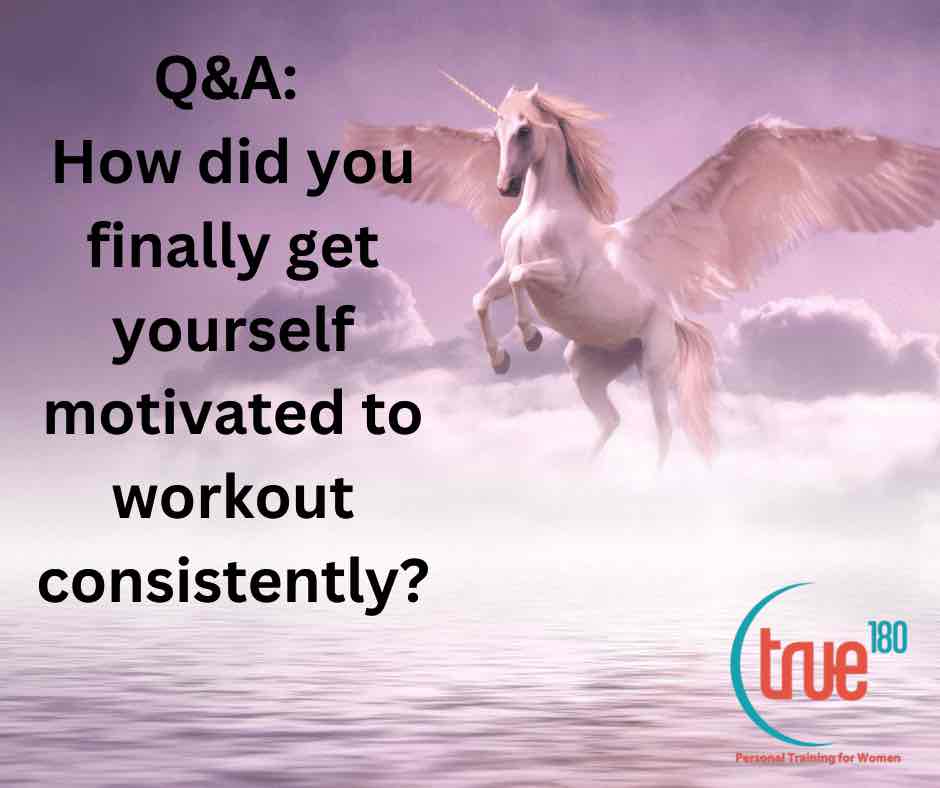Q&A: How did you finally get yourself motivated to workout consistently?
A: I stopped looking for things that don’t exist. Just like 
Nobody thinks unicorns are real, and they’re just used to sell cool shirts and overpriced cotton candy. However, the myth of emotional control and/or “hidden” motivation (you can only find what is lost or hidden) is used to shame us on social media, sell bullshit positive thinking books, and, at worst, push the most vulnerable to join cults to help them “figure it out.”
I’ve personally been conned out of an embarrassing, no, shameful, amount of money in the search for the secrets to more, better or steadier motivation, and I’d like to share what I’ve learned from my many failures. I like the quote, “never take advice from a man without a limp” because you can’t get a practical education without getting your ass kicked until you limp.
The Real Secret
Visualization and affirmation actually destroy drive and reduce action. Motivational gurus like to tell people in their cults that they should “visualize success,” where they see themselves where they want to be. Supposedly this will help the folks in their cults be more successful. However, what decades of research have shown instead, is that seeing yourself at your goal and feeling like you’ve “made it” kills your drive to do anything towards that goal.
In other words, the better you get a pretending (aka “applying ‘the secret’”) the less you do, and the less you do, the less you get. (Perhaps the failure of this advice helps drive future book sales and consulting fees?)
Thoughts are not things. They are thoughts, otherwise they’d be called things the same way that things are.
Negative Emotions = Rocket Fuel
The most worrisome parent is one who does not (or pretends not to) worry about their child. Parents are driven to take action on behalf of their children to the extent they worry about them. This can, and does go horribly wrong when young adults show up to job interviews with their parents, or when parents contort themselves to make unlimited excuses for their children because they worry about hurt feelings.
However, the point is that the worrying drives the care-taking for better and for worse. Negative, not positive, emotions fuel our drive to take action. After hearing about my wife having to bathe, wipe and dress (probably not that order) her grandmother, and knowing this was usually on my mother in law’s daily to-do list I worry about my parent’s skipping their workouts. I stay on my parents so that I can stay off their bottoms.
n all seriousness, I know my parents would loath the day they needed that from me. However, they are human, and we like the path of least resistance. We excel at telling ourselves stories that defy all logic and common sense. I bug them to keep paying their personal trainer, and to keep showing up, and to have more sessions… last year, my mother looked shorter for the first time in my life, and I found out she’d been skipping half her workouts. She’s in her 70’s. I worry about her so I got her a weight vest for Christmas. If instead, I tried to make my “bad” feelings go away, I wouldn’t be a positively annoying son, but, rather an enabler. As I write this I realize I can do more, and that I should probably be more worried about them.
Take an Enema
“The first principle is that you must not fool yourself and you are the easiest person to fool.” Richard P. Feynman
I’m going to go back and pick on my mom. What she told herself was, “I’m too busy taking care of my mom to show up to all of my workouts.” We’re all masters of changing or omitting details to avoid negative feelings.
What my mom really meant was, “I’m too exhausted from taking care of my mom to feel like getting in my own workouts. Because the situation with my mom is so exhausting and unfair [it was!], I feel like I shouldn’t suffer any negative consequences from skipping most of my workouts.”
I told my mom that I was worried about her, that she was shorter than just a few months ago, and that she was complaining about aches and pains that didn’t linger so long when she was more consistent.
It is ironic that facts say, “you’re aches and pains were much worse – more frequent and longer lasting – when you were not working out.” And, our minds say, “I should skip my workout because my knee hurts.” Sarcastic Josef adds, “Why bother working with or around your pain when you can neglect your entire body and throw a pity party instead?”
I think I helped her worry about herself, and see that she’s putting herself at risk of one of her greatest fears – being a burden on her family; and that she’s been in denial.
Bottom Line
You will never always feel like showing up, and anyone selling you the secret to always feeling like it is a con artist. “I don’t feel like it” is the same as “today is partially cloudy.” Emotions and weather come and go, and neither one runs the life of an adult.

